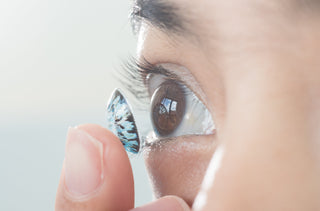For children, who are on the move much more often than adults, glasses can initially seem cumbersome. Convincing your child that it is important to wear glasses can be a real challenge. However, correcting their vision problems is critical to their well-being and learning. So how do you get your child to wear glasses? Several tips can help you when your child refuses to wear glasses.
Ask questions to understand better why your child refuses to wear them
Does your child need glasses? Diplomacy is key to helping your child adopt their new frames. Understanding why your child refuses to wear glasses will help you find appropriate solutions.
Don't hesitate to start the conversation with simple and precise questions regarding:
- Physical comfort
- Visual comfort
- Aesthetics
- Self-image in front of others
You can also discuss the issue with healthcare professionals at an IRIS store. They can check that the frame is correctly adjusted to your child's face. A frame that slips down the nose or rubs on the back of the ears can also cause your child's reluctance to wear (uncomfortable!) glasses.
Name people and characters who wear glasses
Value the people who are close to you that wear glasses. Point to children's characters from books or movies who wear glasses. Examples include the famous Harry Potter, Mirabel Madrigal (Encanto), and Amaya from PJ Masks. Think of some children's characters your little one likes and see if you can find any cultural references that wear glasses that they could resonate with.
Another idea? When taking pictures, ask your child not to take off their glasses. Compliment them. Even if there are reflections in the photos, don't worry! Your kid will soon warm up to their glasses if they feel more confident.
Talking about the positive aspects of wearing glasses
Even when young, children are old enough to understand that eyeglasses help their vision. With a pair of children's eyeglasses that fit their vision, your child will enjoy a better learning experience at school. This can have a considerable impact on their academic performance.
In addition, they can see more clearly during their sports practices and when using digital screens. Not to mention that they avoid unnecessary fatigue and headaches.
Using diversion with kids and eyeglasses
With patience and a little distraction, you'll eventually encourage your child to accept their glasses. Children get used to new things quickly when they are very young, like putting on shoes and mittens in the winter.
When they must wear glasses with prescription lenses, it's best to distract them with a game as you place them on their nose. Habits don't take long to develop at this age; don't hesitate to put the glasses on as soon as they wake up.
Are you looking for a new pair of glasses for your child? Like clothing, eyewear has become a fashion statement. This means that children have a wide variety of frames to choose from to express their personalities and style. Make an appointment to have your child's vision examined, and choose a pair of glasses that will delight them!





















































